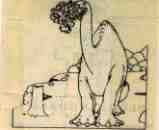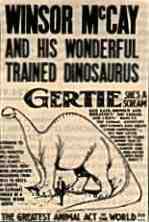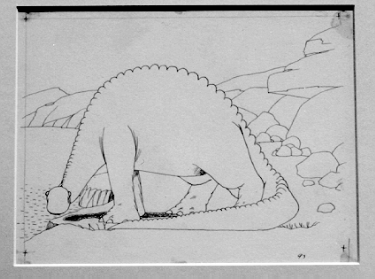

Summary:
Winsor McCay, cartoonist and director of this 1-reel (20-minute)
1914 film, piles out of a car with cartoonist George McManus and
humorist Roy McCardell in front of a natural history museum, where
a 70'-x-20' "dinosaurus" skeleton is on display. McCay
bets a dinner he can make a dinosaur live again by a "series
of hand-drawn cartoons." Six months pass, during which time
10,000 cartoon drawings have been drawn and photographed. Some
comic business involving colossal piles of papers is followed
by the long-awaited dinner. McCay reveals a hand-drawn landscape
on a large screen.
Gertie, a brontosaur, emerges from a cave,
eats a rock and a tree, and bows to the audience. McCay requests
that she raise her right foot. She does, looks at a sea serpent,
is supposed to raise her left foot, is called a "bad girl,"
eats a pumpkin, finally raises the left foot, and eats a stump.
Jumbo, a relatively small elephant meanders by; Gertie flings
him into the lake, gets sprayed when he returns with a trunk full
of water, and rests on her side. A four-winged lizard passes
overhead. Gertie drinks the lake. McCay appears in cartoon form
on the screen and rides her back into the distance. The real
McCay wins his bet.
History:
Gertie was supposedly the most popular cartoon character of this
early era. It seems that at the time, McCay (or another
"ringmaster")
would actually accompany vaudeville theater showings of his cartoon
and walk behind the screen at the right time so as to appear in
cartoon form on the screen. Throwing fruit to Gertie would involve
a similar trick. In 1915, Bray Studios plagiarized this film,
calling it Gertie.

Summary:
Only a few moments of footage survive of Winsor McCay's 1917 sequel
to Gertie the Dinosaur. (John McCay and John Fitzsimmons
are also listed as animators, and the animation is more detailed
than the line figures in the previous film. A 1921 date appears
with the Rialto studio fragment.) When we cut in, we are told
that in Gertie's day, toads were ten feet tall, so a modern small
one disturbs her. After she plays with a train (much more gently
than Kong will), Gertie rests. "As she sleeps she dreams
of other days when she was the life of the party." She dances
among a crowd of brontosaurs.
Commentary: It is worth noting that despite filmdom's inclinations as regards dino-pix, these early pieces offer us a personable and relatively mild dinosaur with a "pet" name. Leonard Maltin asserts that "McCay's efforts during the first ten years of this century are widely considered to be the pinnacle of American comic art. McCay combined the abilities of a superb draftsman with the imagination of a master storyteller." Both Gertie films involve performance in front of an adoring crowd, and one wonders about the nostalgic tone in the fragment of the sequel: an autobiographical impulse on McCay's part?
